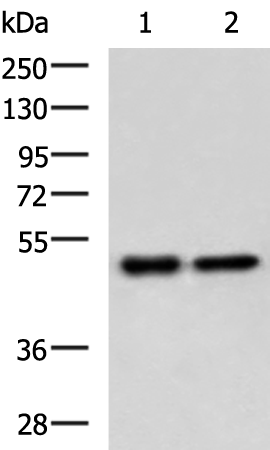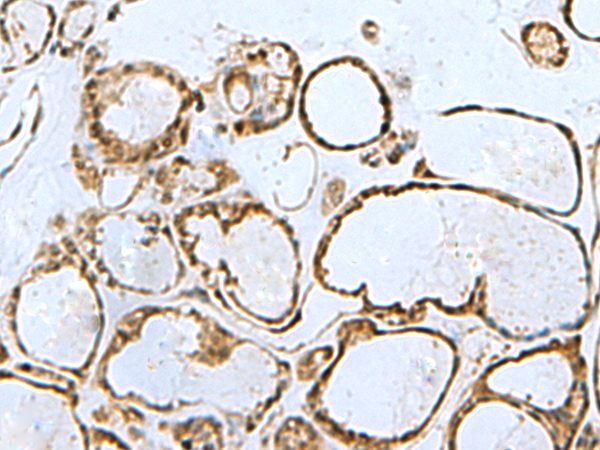

| WB | 咨询技术 | Human,Mouse,Rat |
| IF | 咨询技术 | Human,Mouse,Rat |
| IHC | 1/50-1/100 | Human,Mouse,Rat |
| ICC | 技术咨询 | Human,Mouse,Rat |
| FCM | 咨询技术 | Human,Mouse,Rat |
| Elisa | 1/5000-1/10000 | Human,Mouse,Rat |
| Aliases | E4TF1; GABPB; BABPB2; E4TF1B; GABPB2; NRF2B1; NRF2B2; GABPB-1; E4TF1-47; E4TF1-53 |
| WB Predicted band size | 42 kDa |
| Host/Isotype | Rabbit IgG |
| Antibody Type | Primary antibody |
| Storage | Store at 4°C short term. Aliquot and store at -20°C long term. Avoid freeze/thaw cycles. |
| Species Reactivity | Human, Mouse |
| Immunogen | Synthetic peptide of human GABPB1 |
| Formulation | Purified antibody in PBS with 0.05% sodium azide and 50% glycerol. |
+ +
以下是关于GABPB1抗体的3篇参考文献及简要摘要:
1. **文献名称**:*GABP transcription factor regulates mitochondrial biogenesis and oxidative phosphorylation*
**作者**:Dhar, S. S., et al.
**摘要**:研究利用GABPB1抗体通过ChIP-seq和Western blot分析,揭示GABP复合体(含GABPB1亚基)调控线粒体生物合成相关基因(如核呼吸因子NRF1/2)的表达,影响细胞能量代谢。
2. **文献名称**:*A role for GABP in the regulation of cell cycle progression*
**作者**:Lee, Y., et al.
**摘要**:通过GABPB1抗体阻断实验及siRNA敲低,证明GABPB1通过结合靶基因启动子调控细胞周期蛋白(如Cyclin B1),影响癌细胞增殖和周期进程。
3. **文献名称**:*GABPB1 deficiency suppresses glioblastoma tumorigenesis through metabolic reprogramming*
**作者**:Wang, H., et al.
**摘要**:研究利用GABPB1抗体检测胶质母细胞瘤中蛋白表达水平,发现其缺失导致线粒体代谢异常和ROS累积,抑制肿瘤生长,提示其作为潜在治疗靶点。
以上文献均涉及GABPB1抗体在机制研究或疾病模型中的应用,涵盖转录调控、代谢及肿瘤领域。
GABPB1 (GA-binding protein transcription factor subunit beta-1) is a member of the ETS (E26 transformation-specific) family of transcription factors. It forms a heterodimer with GABPA (GA-binding protein alpha subunit) to regulate genes containing GA-binding promoter elements. This complex plays a critical role in mitochondrial function, cell cycle progression, and cellular metabolism by activating genes involved in oxidative phosphorylation (e.g., COX4I1. TFAM) and ribosomal biogenesis. GABPB1 is ubiquitously expressed, with notable activity in tissues with high energy demands, such as the brain, heart, and skeletal muscle.
Antibodies targeting GABPB1 are essential tools for studying its expression, localization, and interaction partners. They are widely used in techniques like Western blotting (WB), immunofluorescence (IF), chromatin immunoprecipitation (ChIP), and co-immunoprecipitation (Co-IP) to investigate its role in transcriptional regulation and disease mechanisms. Dysregulation of GABPB1 has been implicated in cancer, neurodegenerative disorders, and metabolic syndromes, making its antibody a valuable reagent for both basic research and clinical studies. Commercial GABPB1 antibodies are typically validated for specificity using knockout cell lines or siRNA-mediated knockdown, ensuring reliability in detecting endogenous protein levels across experimental models.
×